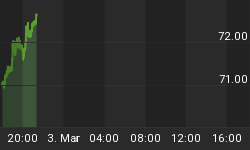Apple is far from the only iconic US company that's signaling a global slowdown. Three more are in the news today:
Caterpillar warns equipment sales still falling
(CNBC) - Caterpillar saw retail sales of machinery fall 16 percent worldwide for the three-month period ended in December, the construction and mining equipment company said on Wednesday.
Caterpillar, which is due to report earnings on Thursday, has been pressured by the global slowdown in the energy and mining industries.
The company said retail sales to resource industries worldwide fell 38 percent over the three-month period, while retail sales to the energy industries fell 32 percent.
The pace of declines is also increasing, the company noted in an SEC filing. The worldwide decline in retail sales of machines had been 11 percent for the three months ended in November.
Goldman Sachs recently downgraded the company to "sell," an unusual and notable call from a major Wall Street firm, saying it expected lower machinery demand from commodity producers.
Caterpillar shares dropped 2.1 percent in early trading. The stock is down about 22 percent since early November and more than 34 percent from its highs last May.
Boeing forecasts 2016 earnings below estimates; shares tumble
(Reuters) - Boeing Co said on Wednesday it would deliver fewer planes in 2016 and forecast earnings below expectations, sending shares tumbling as much as 10 percent to a 52-week low.
The world's biggest planemaker also reported weaker fourth-quarter profit, mainly due to a charge announced last week for slowing production of the 747-8 jumbo.
Boeing expects to deliver 740 to 745 planes in 2016, its centenary year, down from a record 762 in 2015. It will build fewer 737s as it shifts that factory to the upgraded 737 MAX. It also is cutting 747-8 output in response to weak demand.
Boeing forecast 2016 core earnings, excluding some pension and other costs, between $8.15 and $8.35 per share, below the average analyst estimate of $9.43, according to Thomson Reuters I/B/E/S.
Its forecast for about $10 billion in operating cash flow in 2016 raised concern among analysts.
Boeing's net income fell to $1.03 billion, or $1.51 per share, in the fourth quarter, from $1.47 billion, or $2.02 per share, a year earlier.
Core earnings declined to $1.60 per share from $2.31, reflecting a charge for slowing production of the 747-8 jumbo jet. Wall Street looked for core earnings of $1.26 per share, according to Thomson Reuters I/B/E/S.
Fourth-quarter revenue fell about 4 percent to $23.57 billion. Analysts expected $23.53 billion, according to Thomson Reuters I/B/E/S.
Is Bank of America on Life Support?
(The Street) - If the current economic trajectory for global recession holds, and I think it will, one of the victims is going to be Bank of America (BAC). And it probably won't survive.
This is not because of any changes with respect to the company's business strategy. It's because no changes have been made.
Since the Lehman-era crisis, Bank of America has been dealing with legacy issues, buying loan business by offering much lower interest rates to institutional borrowers on commercial and industrial (C&I) loans than the other money centers, and reducing costs by firing people.
That's not a business strategy, though. That's just hunkering down and trying to outwait the economy and business environment with the expectation of "this too will pass."
In the first several years following the Lehman era, the "this too will pass" belief was predicated on the Fed stimulus causing an increase in borrowers that would allow for an increase in economic activity and an ability to both absorb the legacy losses and eventually grow the bank again.
The oncoming recession is going to challenge all four money centers, but it represents an existential crisis for Bank of America because it's going to move from dealing with mortgage legacy issues to dealing with oil-sector loan defaults without any way of cutting costs or buying revenue by offering lower-cost C&I loans than the other three money centers.
The bank has already steadily reduced its labor force for the past seven years, resulting in a 30% cut in total and the smallest number of full-time employees of all the money centers.
Bank of America is on the verge of having investors realize that the bank is in runoff mode.
Three companies in very different fields, all of which are forced to admit that their business model doesn't match the environment. All hope the environment will improve, but in fact it's deteriorating at an accelerating rate. The commodities complex is still contracting due to vast overcapacity (Cat). Air travel is becoming ever-less attractive as former tourist destinations like Greece and Egypt (and Paris) descend into chaos while new diseases make even boarding a plane a life threatening activity. See Women asked to avoid pregnancy as zika virus spreads (Boeing). And banks have leveraged every corner of the world and are running out of people to con into borrowing more. (BofA)
The result: Weak numbers stretching as far as the eye can see, punctuated by the occasional existential crisis. Not the ideal "hot stock" profile.
















